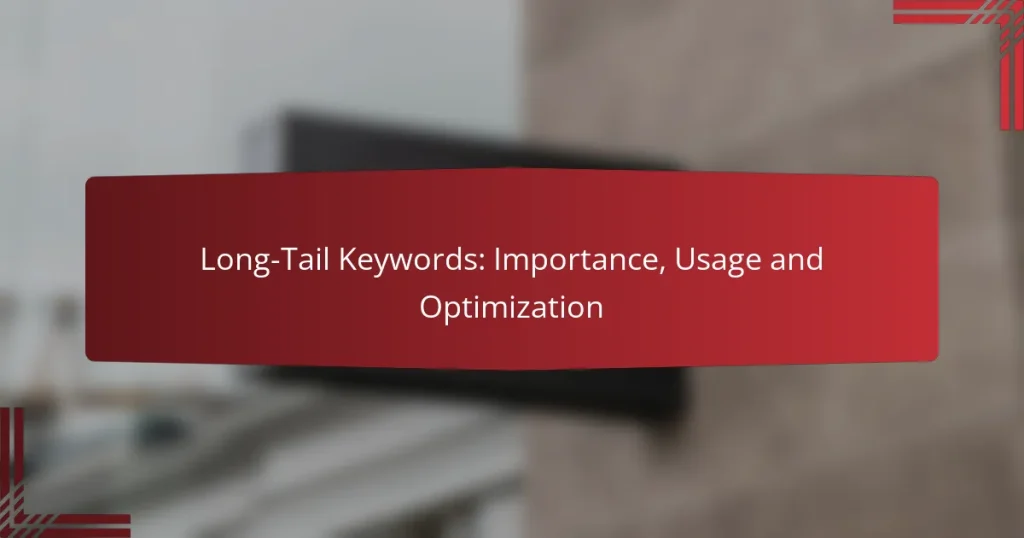Keyword research is a crucial step in app store optimization, as it helps identify the terms potential users are searching for. By understanding your target audience and analyzing competitors, you can refine your keyword strategy using specialized tools that provide valuable insights into search trends and competition. Properly optimizing your app store listings with these keywords can significantly enhance visibility, leading to increased downloads and user engagement.
Keyword Research Strategies: App Categories, Trends and Techniques
Competitor Analysis: Insights, Tools and Strategy Enhancement
High-Value Keywords: Identification Methods, Tools and Impact
Localized Keyword Research: Techniques, Tools and Market Impact
Keyword Research Tools: Features, Benefits and User Experience
Keyword Performance Tracking: Metrics, Tools and Best Practices
How to conduct keyword research for app store optimization?
To conduct effective keyword research for app store optimization, start by identifying relevant keywords that potential users might search for. This process involves understanding your target audience, analyzing competitors, and utilizing various keyword research tools to refine your list.
Identify target audience
Understanding your target audience is crucial for effective keyword research. Consider demographics such as age, location, and interests, as these factors influence the terms users will search for in the app store. Create user personas to visualize your audience’s needs and preferences.
Engage with your audience through surveys or social media to gather insights about their language and terminology. This information will help you tailor your keywords to match their search behavior.
Analyze competitor keywords
Examining the keywords used by your competitors can provide valuable insights into the market landscape. Identify top competitors in your app category and analyze their app descriptions, titles, and tags to see which keywords they prioritize.
Tools like App Annie or Sensor Tower can help you track competitor performance and keyword strategies. Look for gaps in their keyword usage that you can exploit to gain a competitive edge.
Utilize keyword research tools
Keyword research tools are essential for discovering relevant keywords and assessing their potential. Platforms like Google Keyword Planner, Ahrefs, or Mobile Action can provide data on search volume, competition, and trends.
Use these tools to generate a list of keywords, focusing on those with a balance of high search volume and low competition. This approach increases your chances of ranking higher in app store searches.
Evaluate search volume and trends
Evaluating search volume and trends helps you understand which keywords are currently popular and relevant. Look for keywords that have consistent or growing search volumes over time, as these indicate sustained interest.
Seasonal trends can also impact keyword performance. For example, fitness apps may see increased searches in January when users set New Year’s resolutions. Adjust your keyword strategy accordingly to capitalize on these trends.
Prioritize keywords based on relevance
Once you have a list of potential keywords, prioritize them based on relevance to your app’s features and target audience. Focus on keywords that accurately describe your app and align with user intent.
Aim for a mix of short-tail and long-tail keywords. Short-tail keywords are broader and more competitive, while long-tail keywords are more specific and often have lower competition. This combination can enhance your app’s visibility in search results.
What tools are best for app store keyword research?
Effective app store keyword research relies on specialized tools that provide insights into search trends and competition. The best tools help identify relevant keywords, track rankings, and analyze competitors to optimize app visibility.
App Annie
App Annie is a comprehensive analytics platform that offers robust keyword research capabilities. It provides insights into app performance, market trends, and keyword rankings, allowing developers to make data-driven decisions.
When using App Annie, focus on its keyword tracking feature to monitor how your app ranks for specific terms over time. This can help identify opportunities for optimization based on performance metrics.
Sensor Tower
Sensor Tower is another powerful tool for app store optimization, specializing in keyword research and competitive analysis. It offers features like keyword suggestions, search volume estimates, and difficulty ratings for various keywords.
Utilize Sensor Tower’s keyword intelligence to discover high-traffic keywords that are relevant to your app. This can enhance your app’s visibility in both the Apple App Store and Google Play Store.
Keyword Tool
Keyword Tool is a straightforward option for generating keyword ideas for app store optimization. It provides keyword suggestions based on search queries from various platforms, including Google and YouTube, which can be adapted for app stores.
To maximize its effectiveness, combine the suggestions from Keyword Tool with insights from other analytics platforms to create a well-rounded keyword strategy tailored to your app’s niche.
Mobile Action
Mobile Action offers a suite of tools for app store optimization, including keyword tracking and competitive analysis. It helps users identify trending keywords and provides insights into competitors’ keyword strategies.
Leverage Mobile Action’s keyword tracking to adjust your app’s metadata based on real-time performance data. This can lead to improved rankings and increased downloads over time.
How to optimize app store listings with keywords?
Optimizing app store listings with keywords involves strategically placing relevant terms to enhance visibility and attract users. This process can significantly improve your app’s ranking in search results, leading to increased downloads and user engagement.
Incorporate keywords in app title
Your app title is one of the most critical elements for keyword optimization. Including primary keywords in the title can boost your app’s visibility in search results. Aim to keep the title concise, ideally under 30 characters, while ensuring it remains descriptive and appealing.
For example, if your app is a fitness tracker, a title like “FitTrack: Activity & Health Monitor” effectively incorporates relevant keywords while clearly conveying the app’s purpose.
Use keywords in app description
The app description is another vital area for keyword integration. Use a mix of primary and secondary keywords naturally throughout the description to enhance discoverability. Focus on the first few sentences, as they are often the most visible to potential users.
Consider using bullet points to highlight key features, incorporating keywords without sounding forced. For instance, “Track your workouts, monitor your health, and achieve your fitness goals with FitTrack.” This approach keeps the content engaging while optimizing for search.
Optimize keywords in app metadata
App metadata includes fields such as keywords, category, and promotional text, which are essential for keyword optimization. Ensure that you fill out the keyword field with relevant terms, keeping in mind the character limits set by the app store, typically around 100 characters.
Additionally, choose the most appropriate category for your app, as this can influence its visibility. Regularly review and update your keywords based on performance analytics to stay competitive in the app store rankings.
What are the common mistakes in app store keyword research?
Common mistakes in app store keyword research can significantly hinder your app’s visibility and downloads. Key errors include overlooking competitor analysis, overstuffing keywords, and neglecting localization, all of which can impact your app’s ranking and user engagement.
Ignoring competitor analysis
Failing to analyze competitors can lead to missed opportunities in keyword selection. Understanding which keywords successful apps in your category are targeting can provide insights into effective strategies and gaps in the market.
To conduct competitor analysis, identify top apps similar to yours and examine their app titles, descriptions, and keyword choices. Tools like Sensor Tower or App Annie can help you gather this data efficiently.
Overstuffing keywords
Overstuffing keywords in your app’s metadata can lead to poor user experience and may even result in penalties from app stores. Instead of cramming as many keywords as possible, focus on a few relevant terms that accurately describe your app.
A good rule of thumb is to use 3-5 primary keywords in your title and description. Ensure that these keywords flow naturally within the text to maintain readability and appeal to potential users.
Neglecting localization
Neglecting localization can limit your app’s reach in non-English speaking markets. Adapting your keywords and app description to fit local languages and cultural nuances can significantly enhance user engagement and downloads.
When localizing, consider not just direct translations but also regional slang and popular terms. Using local keyword research tools can help identify the most effective keywords for each market, ensuring your app resonates with diverse audiences.





